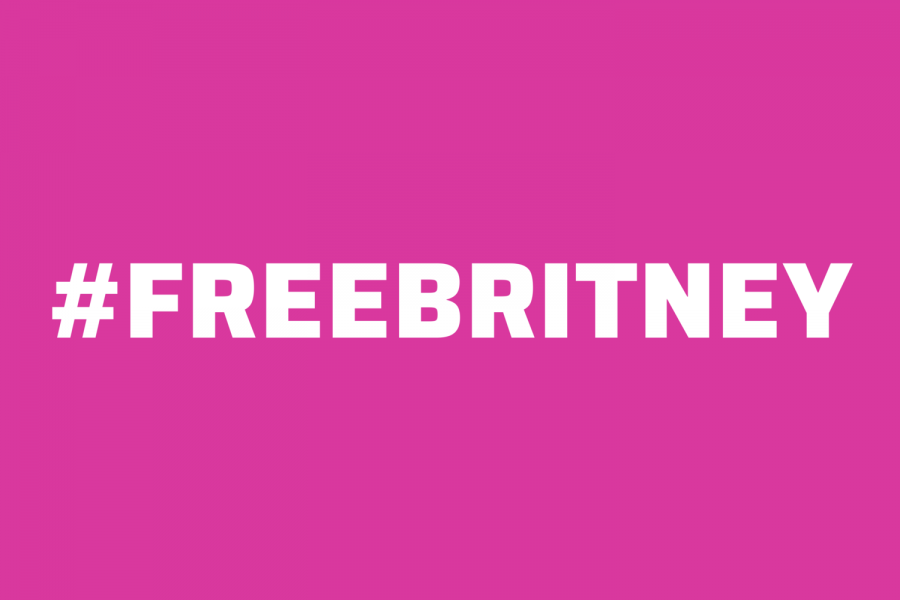Kincart: Free Britney
July 8, 2021
Over the past few months, I have heard the phrase “Free Britney” flying around social media. At first, I thought it was just a lighthearted phrase to be thrown around, but now as I follow Britney’s hearings, I continually learn the importance of her freedom.
After Britney Spears’ public breakdown and stay in a psychiatric hospital, she was placed under the conservatorship of her father.
Britney’s father, Jamie, was granted permanent conservatorship after her release. He oversaw and made decisions regarding Britney’s health, finances, business and personal life.
In 2019, Jamie temporarily stepped aside due to health issues. A professional conservator began to handle her person while Jamie still managed her finances.
Last November, the court granted Britney’s request to appoint Bessemer Trust as a co-conservator of her estate. She hopes to make them the sole conservator and eventually be independent.
Britney’s story highlights an important disability rights issue. Not only does she need her freedom, but conservatorship as a whole needs to change.
One of the most shocking moments from Britney’s testimony was when she revealed her forced sterilization. She said, “I wanted to take the IUD out, so I can start trying to have another baby, but this so-called team won’t let me go to the doctor to take it out because they don’t want me to have any more children.”
Disability rights activist Rebecca Cokley explained, “Britney Spears has experienced the nexus of sexism and sanism in the public eye and now the court system. Having her right to parent, her right to work or not to work, her very right to bodily autonomy taken away for someone’s profit for 13 years is a public policy failure. One all too common for people with mental illness and developmental disabilities.”
There’s a history of involuntary sterilization forced upon disabled Americans. The legal precedent set in Buck v. Bell perpetuates this atrocity. Cokley furthered, “Buck v. Bell is still law today and allows the state to sterilize people with disabilities against their will. Britney’s IUD story is the legacy of that case.”
1.3 million adults are under conservatorship or guardianship. At least 50 billion dollars of assets fall under conservatorships. Yet, it’s something that is seldom discussed in our political conversations.
“Free Britney” has brought disability rights into the mainstream media. We need to recognize that Britney was deemed disabled by the courts and that conservatorship and guardianship happen more frequently than discussed for disabled people.
The significance of “Free Britney” is evidenced by many of my recent conversations with my peers. Months ago, I felt like any discussion of potential disability policy changes were beyond my friends’ media diets. But now, I can casually say, “Free Britney,” and everyone in the room has a reaction and knowledge of what is happening.
If I am scrolling through Twitter, it only takes me a few minutes to stumble upon a “Free Britney” tweet. If I’m scrolling through Instagram, it’s only a matter of time before I see someone wearing a “Free Britney Bitch” t-shirt.
Although not everyone may recognize the significance of Britney’s story to disability rights, policy makers need to capitalize on this popularity to make changes to conservatorship.
Conservatorship and guardianship laws vary by state. In Utah, the reasons for appointing a conservator are vague, citing “some other cause” as a justification for conservatorship.
Reasons for appointment need to be narrowed to avoid the atrocities we currently see with conservatorship. Better yet, conservatorship should just be banned and replaced with measures that better support self-determination.
An alternative to conservatorship is supported decision-making which allows people with disabilities to control who supports them and make their own decisions.
Conservatorship is all too common, and we are finally talking about it. So let’s use Britney’s story to advance the rights of all disabled people.
We need to understand how our justice system hurts disabled people. Use the popularity of the “Free Britney” movement to support policy makers who are actively working to help the disabled community. Contact your state representatives and urge them to make changes to conservatorship.
We owe it not only to Britney to change conservatorship laws, but to the 1.5 million other adults who don’t have control over their own lives as well.
I leave you with the wise words of all of the mass-marketed merchandise resulting from the popularity of this issue, “Free Britney, Bitch.”








